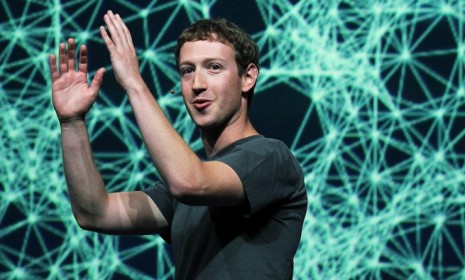Facebook's 'eye-popping' IPO: 5 surprises
A number of revelations are hidden among the data points in the social network's S-1 filing

A free daily email with the biggest news stories of the day – and the best features from TheWeek.com
You are now subscribed
Your newsletter sign-up was successful
Facebook filed for a $5 billion initial public offering this week, producing more than a few billionaires. But sprinkled through the S-1 filing's charts and figures were a number of "eye-popping" surprises, including a bizarre hacker manifesto penned by Mark Zuckerberg himself. Here, 5 other revelations:
1. The executive board will have little voting power
In one "very important way," Facebook is still a private company, says Mathew Ingram at Giga Om. That's because Zuckerberg owns a special class of stock that gives him super-voting rights, the equivalent of 57 percent of the company's votes. "In other words, you may own stock in the company, but you have virtually no say in what happens to it." Zuckerberg will wield essentially the same power he did when the company was private, and, if he dies while running the company, that power will transfer to whomever he designates as his successor. Like Steve Jobs — whose control over Apple yielded some "incredible, world-changing products" — Zuckerberg will still be able to follow his vision, doing "whatever he wants with Facebook," public or not.
The Week
Escape your echo chamber. Get the facts behind the news, plus analysis from multiple perspectives.

Sign up for The Week's Free Newsletters
From our morning news briefing to a weekly Good News Newsletter, get the best of The Week delivered directly to your inbox.
From our morning news briefing to a weekly Good News Newsletter, get the best of The Week delivered directly to your inbox.
2. Zuckerberg's security detail is built into his compensation
The Facebooker-in-Chief made a salary of $483,333 in 2011, significantly less than the company's other chief officers, says Hayley Tsukayama at the Washington Post. But Zuckerberg received "other" compensation in the form of "chartered travel costs and security details," amounting to $783,529. "We require these security measures for the company's benefit because of the importance of Mr. Zuckerberg to Facebook," notes the document filing, "and we believe that the costs of this comprehensive security program are appropriate and necessary."
3. The company values Sheryl Sandberg to an unexpected degree
The filing includes a list of potential risk factors for investors to monitor warily, most notably the failure to gain new users and new advertisers, says Christopher Zinsli at the Wall Street Journal. Also listed as a "risk"? The potential loss of chief operating officer Sheryl Sandberg, who's clearly considered indispensable. This is "a surprising if not shocking mention for the former Google executive," says Tsukuyama. Some speculate that Sandburg may be considering a role in politics.
A free daily email with the biggest news stories of the day – and the best features from TheWeek.com
4. Facebook doesn't know what to do with its mobile users
"More than 425 million users accessed Facebook from mobile devices in December 2011," says Brittany Darwell at Inside Facebook. That's a 70 percent increase since March 2011. But the company concedes that it doesn't yet know how to monetize users who access Facebook's mobile products, and acknowledged that "business will suffer if it cannot." Facebook, which doesn't run display ads on its mobile products now, will have to find "a clever, non-intrusive way to use all of its data for mobile marketing," says Tsukayama. Otherwise, this could become a "huge deal."
5. Each user is worth than less $5
It's "easy to be overwhelmed" parsing all the new data, says Alexis Madrigal at The Atlantic. But one number "matters more than all the others": $4.39. That's the revenue per monthly active Facebook user — and it's not enough to justify a market capitalization of $100 billion, even if the company somehow hits 3 billion users. Facebook needs to "double the amount of money they squeeze out of each user," with much more advertising and more revenue "from the companies selling credits to purchase virtual items, primarily in games produced by companies like Zynga." With user growth starting to slow, raising the value of each user is crucial.
-
 Trump wants a weaker dollar but economists aren’t so sure
Trump wants a weaker dollar but economists aren’t so sureTalking Points A weaker dollar can make imports more expensive but also boost gold
-
 Political cartoons for February 3
Political cartoons for February 3Cartoons Tuesday’s political cartoons include empty seats, the worst of the worst of bunnies, and more
-
 Trump’s Kennedy Center closure plan draws ire
Trump’s Kennedy Center closure plan draws ireSpeed Read Trump said he will close the center for two years for ‘renovations’